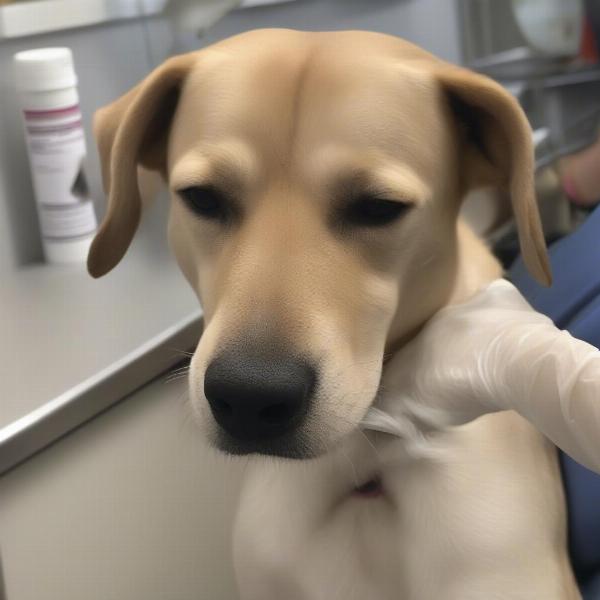Dealing with a dog in pain after their vaccine shot can be a worrying experience for any owner. While some discomfort is normal, knowing what to expect and when to seek veterinary help is crucial. This article will guide you through common reactions, pain management techniques, and potential complications related to dog vaccinations.
Understanding Post-Vaccine Discomfort in Dogs
It’s common for dogs to experience mild discomfort after receiving a vaccine. This is a natural response as the vaccine stimulates the immune system. Common signs of discomfort include:
- Soreness at the injection site: Your dog might flinch when you touch the area or lick it excessively.
- Lethargy: Some dogs become less active and might sleep more than usual.
- Decreased appetite: A temporary loss of appetite isn’t unusual.
- Mild fever: A slight increase in body temperature can occur.
These symptoms typically resolve within a few days and are generally nothing to be concerned about.
Managing Your Dog’s Pain After Vaccination
If your dog appears uncomfortable, there are some steps you can take to help manage their pain:
- Apply a warm compress: A warm, damp cloth applied to the injection site can help soothe soreness.
- Provide a comfortable resting area: Ensure your dog has a quiet, comfortable place to rest and recover.
- Offer plenty of fresh water: Encourage your dog to drink water to stay hydrated.
- Monitor their appetite: If your dog refuses food for more than 24 hours, consult your veterinarian.
When to Seek Veterinary Attention
 Dog with allergic reaction after vaccine
Dog with allergic reaction after vaccine
While mild discomfort is expected, certain symptoms warrant immediate veterinary attention. Contact your vet immediately if you observe:
- Severe swelling or redness at the injection site: Significant swelling or redness that spreads beyond the injection site can indicate infection.
- Difficulty breathing: This is a sign of a potentially serious allergic reaction.
- Vomiting or diarrhea: Persistent vomiting or diarrhea could signal a more severe reaction.
- Hives or facial swelling: These are also signs of an allergic reaction and require immediate attention.
- Collapse or seizures: These are rare but serious potential side effects.
Dr. Emily Carter, DVM, from the Animal Medical Center of New York, emphasizes, “It’s always better to err on the side of caution. If you’re at all concerned about your dog’s reaction to a vaccine, don’t hesitate to contact your veterinarian.”
Preventing Vaccine Reactions
While not all reactions can be prevented, discussing your dog’s health history with your veterinarian before vaccination can help minimize risks. Be sure to mention any previous allergic reactions or sensitivities your dog has experienced.
Dr. David Lee, a veterinary immunologist, advises, “Open communication with your vet is key. By discussing your dog’s individual health needs, you can work together to develop a vaccination plan that minimizes the risk of adverse reactions.”
Conclusion
While some discomfort after a vaccine is normal, being aware of the signs and symptoms of more serious reactions is crucial. By monitoring your dog closely and seeking veterinary attention when necessary, you can ensure their health and well-being. Remember to discuss any concerns with your veterinarian before and after vaccination.
FAQ
- How long does soreness after a vaccine usually last? Soreness typically subsides within a few days.
- Can I give my dog pain medication after a vaccine? Never give your dog human pain medication without consulting your vet.
- Are vaccine reactions common in dogs? Mild reactions are fairly common, but serious reactions are rare.
- What are the signs of a severe allergic reaction to a vaccine? Signs include facial swelling, hives, difficulty breathing, vomiting, and collapse.
- Should I be concerned if my dog has a slight fever after vaccination? A slight fever is a common side effect and usually resolves quickly.
- Can vaccines cause lumps at the injection site? Sometimes a small, firm lump can form at the injection site and should disappear within a few weeks. Consult your vet if it persists.
- What should I do if my dog refuses to eat after vaccination? Monitor their appetite and consult your vet if they refuse food for more than 24 hours.
ILM Dog is your go-to resource for expert advice on all aspects of dog care and well-being. We offer a wealth of information on dog breeds, health, training, nutrition, grooming, and much more. From puppy care to senior dog care, we’re here to support you every step of the way. Contact us today for personalized advice and support. Email: [email protected], Phone: +44 20-3965-8624. Visit ILM Dog for more information.